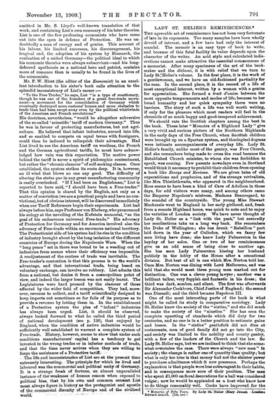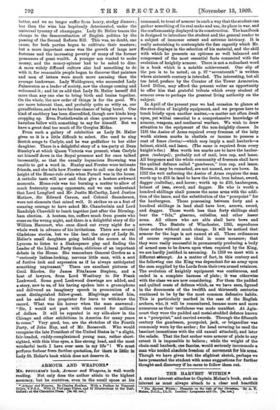LADY ST. HELIER'S REMINLSCENCES.*
THE agreeable art of reminiscence has not been very fortunate of late in its exponents. Too many samples have been wholly devoid of interest, and a few have had only the interest of scandal. The memoir is an easy type of book to write, and because of this fatal facility its value depends upon the character of the writer. An acid style and calculated indis- cretions cannot make attractive the essential commonness of a memorist. After many specimens of the art of the book- maker and the declossé, it is with relief that we turn to Lady St.:Helier's volume. In the first place, it is the work of a gentlewoman, and we have an old-fashioned partiality for the race. In the second place, it is the record of a life of most exceptional interest, written by a woman with a genius for appreciation. She formed a trait d'union between the most opposite temperaments and modes of life; because to her broad humanity and her quick sympathy there were no barriers. The story of such a life was well worth writing, if only for the pleasure which most readers will feel in the chronicle of so much happy and good-tempered achievement.
We should rate the Scottish chapters among the best in the book. These later " Memoirs of a Highland Lady " give a very vivid and curious picture of the Northern Highlands in the early days of the Free Church, when Scottish children were brought up on a Spartan system, and theological dogmas were intimate accompaniments of everyday life. Lady St. Helier's family, unlike most of the gentry, was Free Church, and she remembers being made to cross the road because the Established Church minister, to whom she was forbidden to speak, was coming. Few parents nowadays even in Scotland would think it necessary to prohibit their children from opening a book like Essays and Reviews. We are given tales of old superstitions and prophecies, and of the strange revivalists, like Mrs. Thistlethwaite, who appeared in the neighbourhood. Ross seems to have been a kind of Cave of Adullarn in those days, for odd visitors were many, and among others came the Emperor Napoleon's mistress, Madame Beauregard, to the scandal of the countryside. The young Mims Stewart Mackenzie went to England in her early girlhood, and, fresh from a remote Highland home, was quick to note and to enjoy the varieties of London society. We have never thought of Lady St. Helier as a "link with the paet," but assuredly her recollections take ns a, long way back. She remember-1s the Duke of Wellington ; she has drunk " Rebellion " port laid down in the year of Culloden, which we fancy few men living have done; she knew Lady Palmerston in the heyday of her salon. One or two of her reminiscences give us an odd sense of being close to another age. She has seen Lady Palmerston kissing her husband publicly in the lobby of the House after a sensational division. But best of all is one which Mrs. Norton told her. Once Mrs. Norton was dining with Lord Melbourne, and was told that she would meet three young men marked out for distinction. One was a clever young lawyer ; another was a brilliant talker, very foppish and fantastic in his dress ; the third was dark, sombre, and silent. The first was afterwarda Sir Alexander Cockburn, Chief Justice of England; the second was Disraeli ; and the third became Napoleon III.
One of the most interesting parts of the book is what might be called its study in comparative sociology. Lady' St. Helier knew the society of the " sixties," and she did much to make the society of the "nineties." She has seen the complete upsetting of standards which did duty for two centuries, and no one is in a better position to estimate gains and losses. In the " sixties" gentlefolk did not dine at restaurants, men of good family did not go into the City, and society was limited to the nobility and county gentry, with a few of the leaders of the Church and the law. So Lady St. Helier says, but we are inclined to think that she some- what overstates the case. There were always "new men" society ; the change is rather one of quantity than quality; but what is only too true is that money had not the sinister powei to purchase admittance which it now possesses. Perhaps the explanation is that people were leas extravagant in their habits, and in consequence more sure of their position. The- man who spent £1,000 on floral decorations for a ball was considered vulgar; now he would be applauded as a host who knew how to do things reasonably well. Cooks have improved for the • Memories of Fifty Years. By Lady St. Helier (]Lary Jim* Luadon. Edward Arnold. [L56. net.1
better, and we no longer suffer from heavy, stodgy dinners ; but then the wine has hopelessly deteriorated, under the universal tyranny of champagne. Lady St. Helier traces the
change to the democratisation of English politics by the passing of the Second Reform Bill. This was, no doubt, one cause, for both parties began to cultivate their masters ; but a more important cause was the growth of large new fortunes and the increasing poverty of many of the former possessors of great wealth. A younger son wanted to make money, and the money-spinner had to be asked to dine. A more widely diffused culture also had something to do with it, for reasonable people began to discover that painters and men of letters were much more amusing than the average landowner. Lady Waldegrave, who succeeded Lady Palmerston as a leader of society, saw the change coming and welcomed it ; and let us add that Lady St. Helier herself did more than any one else to bring birth and brains together. On the whole, the new order of things is for the good. We are more tolerant than, and probably quite as witty as, our grandfathers, and we have far less chance of being bored. One kind of snobbery has been discredited, though new kinds keep cropping up. Even Postlethwaite at close quarters proves a harmless fellow with something to say for himself. But we have a great deal too much of Sir Gorging Midas.
From such a gallery of celebrities as Lady St. Helier gives us it is a little difficult to select. She used to sing Scotch songs to Carlyle, and he was godfather to her elder daughter. There is a delightful story of a tea-party at Dean Stanley's at which Queen Victoria was present, when Carlyle sat himself down in the Royal presence and for once talked incessantly, so that the usually loquacious Browning was
unable to get a word in. Huxley and Forster were intimate
friends, and she tells how Forster came to call one day at the height of the Home-rule crisis when Parnell was in the house.
A catholic taste will now and then give a hostess awkward
moments. Home-rule was too burning a matter to allow of much fraternity among opponents, and we can understand that Lord Longford and Mr. Justin McCarthy, Lord Justice Mathew, Sir Edward Carson, and Colonel Saunderson, were not elements that mixed well. It strikes us as a feat of amazing courage to have asked Mr. Chamberlain and Lord Randolph Churchill to lunch together just after the Birming- ham election. A hostess, too, suffers much from guests who come on the wrong night, and there; is a delightful story of Sir William. Harcourt, who once dined out every night for a whole week in advance of his invitations. There are several Gladstone stories, but we like best. the story of Lady St. Helier's small daughters going • behind the scenes at the Lyceum to listen to a Shakespeare play and finding the Leader of the. Liberal Party there, oblivious of an important debate in the House. She remembers General Gordon as a "curiously listless-looking, nervous little man, with a sort of furtive look and expression as if he always anticipated something unpleasant." There are excellent pictures of Cecil Rhodes, Sir James FitsJames Stephen, and a host • of lawyers, from Lord Westbury to Sir Frank Lockwood. Some good Lockwood drawings are added, and a story, new to us, of his having spoken into a. gramophone and delivered an imaginary speech in prosecution of a most distinguished fellow-guest. Misgivings seized him, and he asked the proprietor for leave to withdraw the record. What was his horror when the man answered : " Sir, I would not part with that record for millions of dollars. It will be repeated in my side-show in the Chicago and other exhibitions in America . for many years to come." Very good, too, are the sketches of the Fourth Party, of John Hay, and of Mr. Roosevelt. Who would recognise the late President of the .United States in "a slight, fair-headed, ruddy-complexioned young man, rather short- sighted, with thin blue eyes, a fine strong head, and the most wonderful teeth I have ever seen in my life "1 We must perforce forbear from further quotation, for there is little in Lady St. Helier's book which does not deserve it.















































 Previous page
Previous page